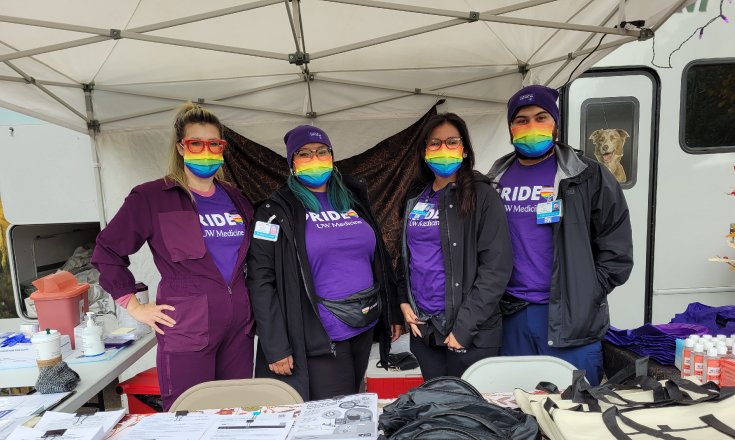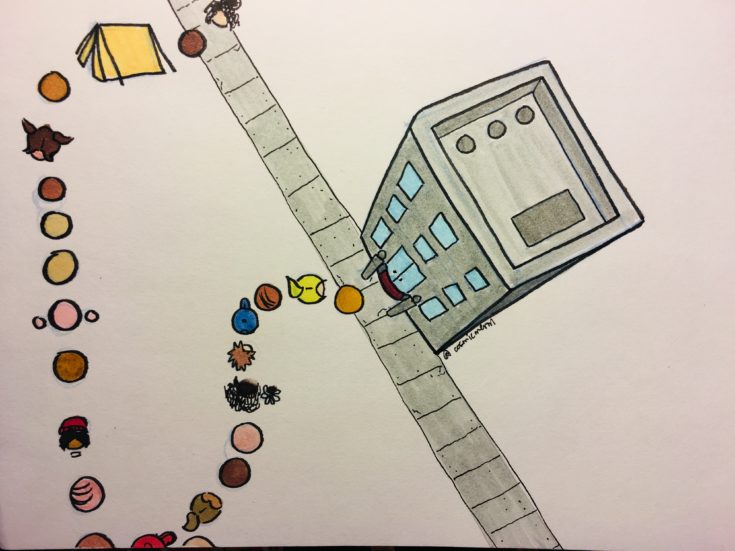Capitol Hill Rally For International Working Women’s Day: Advocating Intersectional Feminism, Indigenous Rights, Palestinian Liberation, and Global Solidarity
On March 8, activists and feminists rallied to commemorate International Women’s Day. Spearheaded by the International Working Women’s Day Coalition, this event transcended geographical boundaries, amplifying voices and advocating for global liberation struggles, with an emphasis on solidarity with Palestine.
The evening commenced with a speak-out and an informational fair against the backdrop of the AIDS Memorial Pathway. As dusk settled, participants embarked on a night march around Capitol Hill. Their fervent chants called for justice, equity, and empowerment.
People = Power
The organizing coalition boasts a multifaceted composition, encompassing women’s rights advocates, pro-Palestinian activists, indigenous communities, and socialist groups. Notable among its esteemed members are organizations including Falastiniyat, Feminists For Jina Seattle, Friends on Bikes, GABRIELA Seattle, International Women’s Alliance, Seattle Green Wave, Half The Sky Pacific Northwest, International League of Peoples’ Struggles Seattle-Tacoma, Northwest Animal Rights Network, Puget Sound Mobilization for Reproductive Justice, Radical Women (Seattle branch), Resist US-Led War Seattle, South Asians Resisting Imperialism (SARI), Surge Reproductive Justice, The Pacific Northwest Organizing Chapter of International Migrants Alliance, Nathan Hale High School Muslim Student Association, Freedom Socialist Party Seattle, Mutual Aid South & East King, Water Warriors, and Afghanistan Women’s Political Participation Network.
The event is described by coalition members as “a unifying call to support the ongoing resistance in Palestine and to stand shoulder-to-shoulder with working women, trans, non-binary, queer individuals, and all oppressed peoples around the world. Our collective aim is to affirm the human right to bodily autonomy and a life free from discrimination and violence. Together, we will walk in the path of transnational feminist movements against imperialism, colonialism, capitalism, patriarchy, racism, and religious fundamentalist states towards liberation for all.”
Indigenous Voices
Rosalie Fish, a track champion of the University of Washington and an Indigenous activist, unveiled a stark reality often relegated to the shadows: the pervasive epidemic of missing and murdered Indigenous women, girls, and two-spirit individuals. Her impassioned words reverberated, carrying the burden of generations of injustice while also kindling the flame of hope for substantive change.
Millie Kennedy, a revered member of the Tsimshian people belonging to the Raven Clan, orchestrated a rendition of the “Women’s Warrior Song.” Its haunting melody evidences the enduring pain and resilience of Indigenous communities worldwide. Standing alongside her were Fish and two other Indigenous women, their voices merging in powerful harmony.
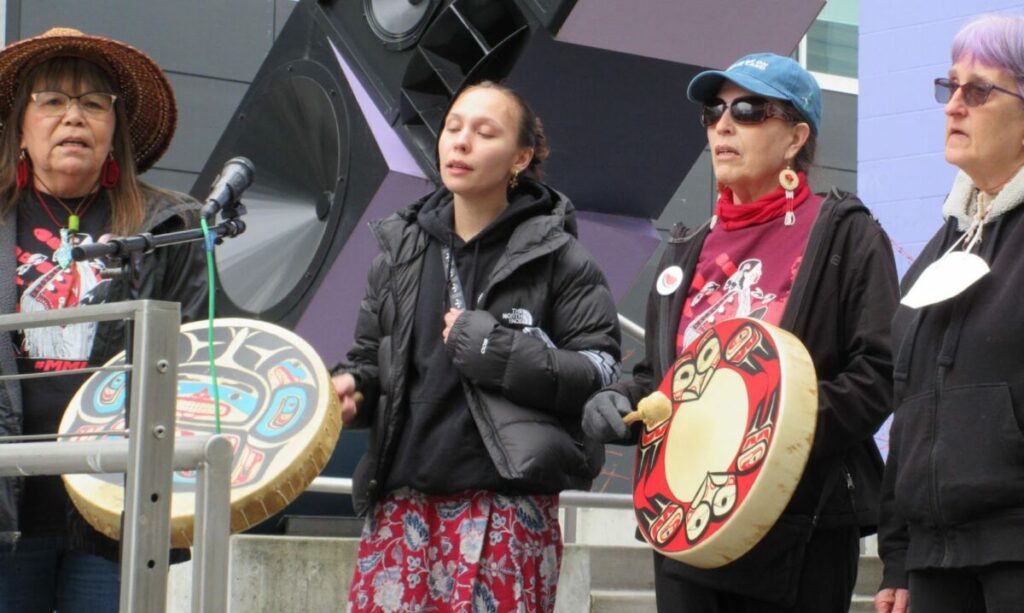
Feminist Frontiers
Zeinab, an advocate representing Feminists for Jina, stated, “Solidarity with Palestine and the fight for Palestinian liberation are fundamental to any international solidarity.” Zeinab highlighted an interconnection between women’s emancipation with broader struggles against racism, state oppression, warfare, and territorial domination. Emphasizing the role of Palestinian liberation within the feminist movement, Zeinab underscored a need for unified alliances, conveying that solidarity is not merely necessary but an urgent imperative.
Jackie Vaughn, Executive Director of Surge Reproductive Justice, stressed the role of women and gender-diverse individuals, stating, “We are the key to undoing the way that white supremacy, capitalism, and patriarchy work together.” Vaughn urged attendees to approach liberation struggles in an intersectional manner. “We understand how all of our movements are connected, and we do not leave anyone behind.”
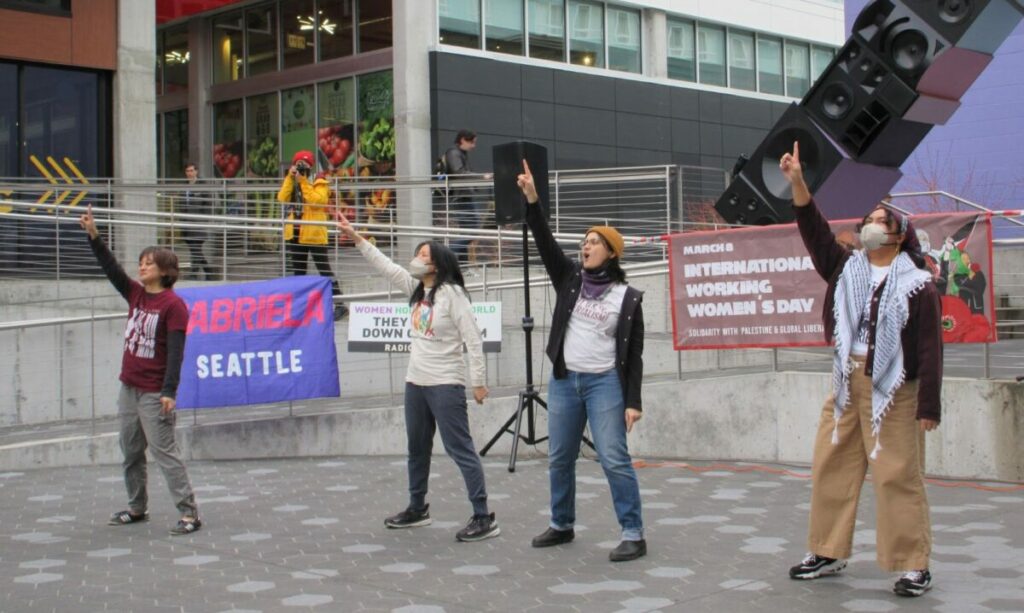
Resisting Oppression
Zaytouna, an advocate for Falastiniyat, articulates, “We are rising up across cities in the heart of the U.S. empire, in this belly of the beast that has fueled the colonization and dispossession of the Palestinian people.” Drawing from the powerful verses of Noor Hindi, a Palestinian feminist poet, Zaytouna invokes the spirit of resistance through excerpts from the evocative anthology “DEAR GOD. DEAR BONES. DEAR YELLOW,” notably sharing a piece titled “Palestine.”
Heat, representing the Seattle chapter of Resist US-Led War, condemns the grave repercussions of U.S.-led imperialism on women, notably in Palestine, attributing much of the suffering to American military backing of Israel. Heat decries, “While Palestinians are facing these horrific conditions, the U.S. is aiding and abetting this genocide by providing arms to Israel and starving Gaza. And this is just one example of violence that U.S. militarism inflicts as the highest form of patriarchal oppression.” Ending with a resolute call to action, Heat urged resistance against corporations like Boeing. “We can’t win the fight against imperialism without women. We will protect one another, stand against capitalist exploitation, and defend ourselves against the imperial powers that do not see us as people.”
Génesis, the chairperson of Capybara Colectiva, highlights the disproportionate impact of U.S. imperialism on women, emphasizing, “We know they are the most affected.” Génesis draws parallels between the plight of mothers in Palestine and Latin America, where children suffer due to economic exploitation, stating, “We see children being carried by their mothers as they look and search for a better life. One that was stolen from them by U.S. imperialism.” Génesis underscores the interconnected struggles of oppressed women worldwide against U.S. imperialism, urging solidarity and action, saying, “The women of Palestine and Latin America are tied together in their blood, sweat, and tears, and in their fight for the fall of U.S. imperialism.”
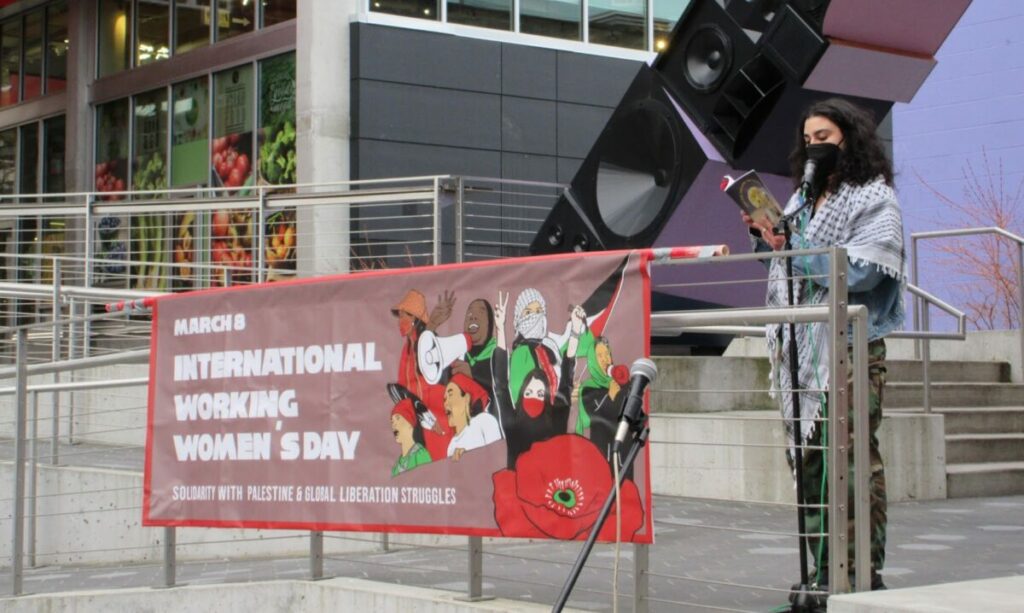
Mobilizing Change
Katie Comfort, U.S. Coordinator for the International Women’s Alliance, energized, “Today our members all around the world are mobilizing, not just to celebrate being women, but to collectively demand change.” Amplifying the voices of working women amidst economic violence and disregard, Comfort passionately advocated for a seismic shift towards a fresh societal narrative, saying, “Let International Working Women’s Day be the reminder that we have to fight for something new.” Comfort urged individuals to unite with organizations dedicated to women’s rights, “We have to realize that we cannot just mobilize for change, for reforms, to win back the rights that have been taken from us.” Spotlighting the critical imperative of global cooperation, Comfort insisted, “We have to mobilize for something different and something new.”
Christina López, representing Radical Women, emphasized the historical significance of International Women’s Day, tracing its roots back to socialist and labor movements in the early 20th century. López highlighted the pivotal role of immigrant women in fighting for better working conditions and stressed the need for solidarity with liberation struggles worldwide, particularly in Palestine. López called for a united feminist movement to combat oppression, advocate for reproductive justice, end racial violence, and build a world free of capitalism, imperialism, racism, sexism, transphobia, and homophobia: “A world that is run by and for the people instead of profits.” López urged collective action to envision a world governed by the people, concluding with a call for international solidarity and a chant for unity: “From Palestine to Mexico, all these walls have got to go.”
Malali Popalzai, a member of Afghanistan Women’s Political Participation Network, advocates against child marriage in her native country, where Taliban restrictions severely curtail women’s rights, including access to education and employment. Reflecting on International Women’s Day, she lamented the lack of rights for Afghan women, stating, “This is not their rights; this is not human’s right.” Popalzai’s pleas for the urgency of securing fundamental rights and freedoms for Afghan women echo the broader call to liberate Afghan society from oppressive regimes and discriminatory practices.
Resounding Calls for Change
As the march started, voices resonated with a fierce determination:
“Get up! Get down! Feminists control this town!”
“Not the church! Not the state! Women will decide our fate!”
“Our bodies, our lives, our right to decide!”
“Mujeres unidas, Jamas sera vencida!” (Women united will never be defeated)
“Money for childcare and education, not for war and occupation!”
“Hey, hey, ho ho! Patriarchy’s got to go!”
“People! Power! People! Power!”
“Defend our life givers: Women, water, land, and sky!”
These cries reverberated through the streets of Capitol Hill, encapsulating the spirit of resistance and resilience that defined the march of voices in defiance against systemic oppression.
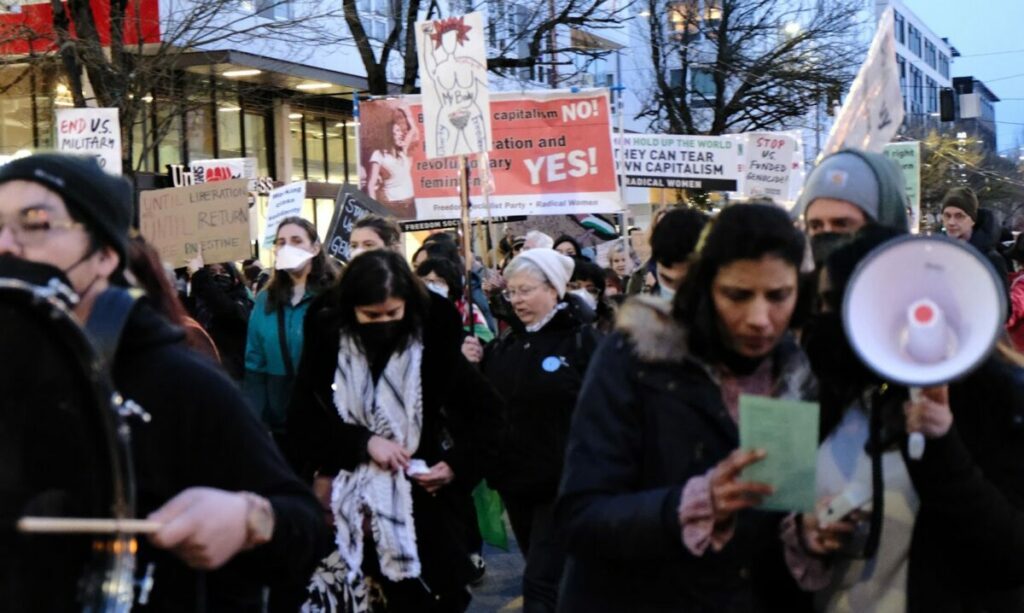
Global Unity and Solidarity
The rally served to show the marcher’s dedication to intersectional feminism and global solidarity. With banners held high and voices raised in unison, participants urged the cause of Palestinian liberation, intertwining the struggles of others with those in Gaza:
“Gaza, Gaza, you will rise. Palestine will never die!”
“From the river to the sea, Palestine will be free!”
“Free free Palestine, within our lifetime!”
“Resistance is justified when people are occupied!”

Demanding Justice
From Turtle Island to Palestine, from Seattle to Kabul, the rally underscored the relations of global liberation movements.
“Biden Biden, you can’t hide! We charge you with genocide! Biden Biden, you will learn! By the millions, we’ll return!” proclaimed marchers.
From Seattle to Gaza, the marchers asserted with unwavering determination: “Globalize the intifada!”

On this International Working Women’s Day, the thoroughfares of Capitol Hill bore witness to a stirring manifestation of solidarity.

Danika is an aspiring journalist based in Seattle. Born and raised in Jakarta, she has long been drawn to the gravity of stories—the way they hold what might otherwise slip through the day. As editor-in-chief, she approaches her work with curiosity more than certainty, trusting small details to reveal larger truths. For her, storytelling is less about control than attention: a practice of listening closely and noticing what remains after the noise.




